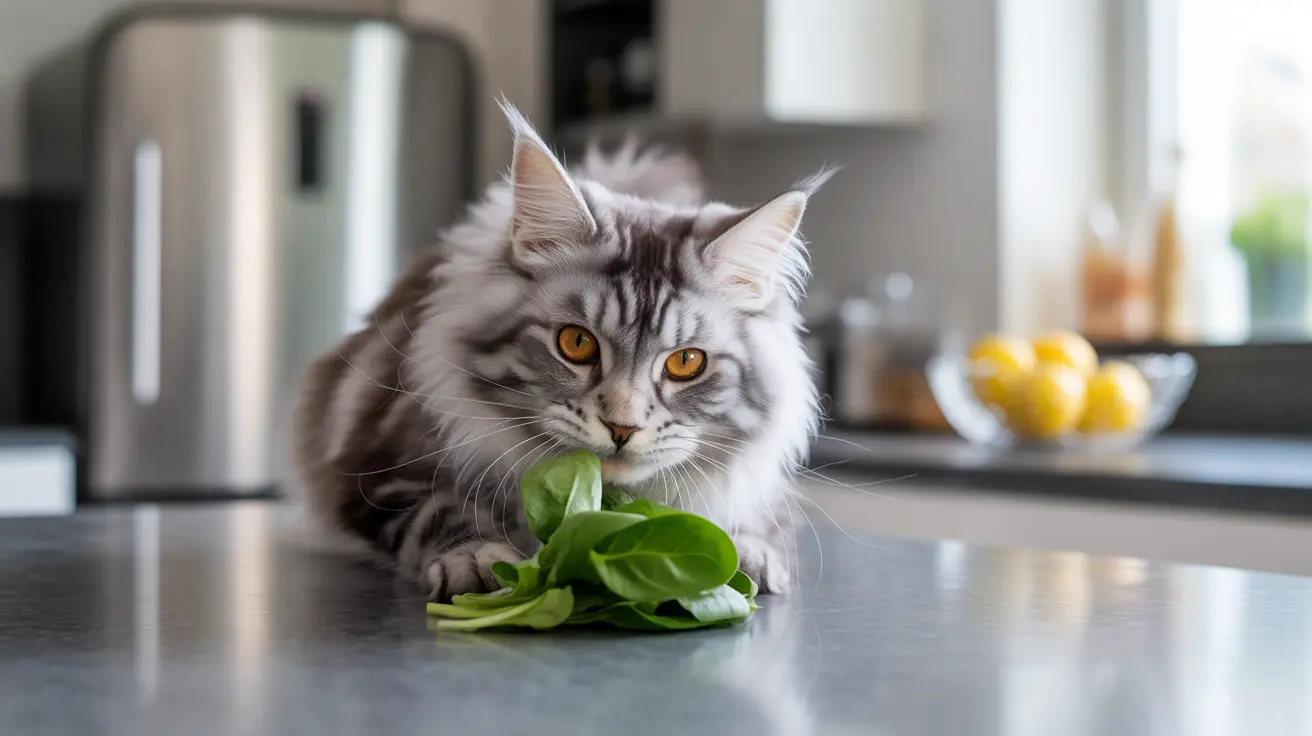The Nutritional Benefits of Spinach for Cats
Spinach packs an impressive array of nutrients that can complement your cat's regular diet. This leafy green contains:
- Vitamins A, C, K, B6, B2, and E
- Iron and magnesium
- Calcium and potassium
- Dietary fiber
- Antioxidants
These nutrients can support various aspects of feline health, from vision and immune function to tissue repair and bone strength. However, it's important to remember that cats can get all necessary nutrients from high-quality commercial cat food.
Important Safety Considerations and Risks
While spinach isn't toxic to cats, there are several important factors to consider before adding it to your pet's diet:
Oxalate Content
The most significant concern with spinach is its high oxalate content. These compounds can bind with calcium and potentially form kidney or bladder stones, particularly in cats with existing urinary tract issues.
Health Conditions That Rule Out Spinach
Cats with the following conditions should NOT eat spinach:
- History of kidney disease
- Urinary tract problems
- Previous bladder stones
- Calcium oxalate crystals
How to Safely Serve Spinach to Your Cat
Preparation Methods
If you decide to offer spinach to your healthy cat, follow these guidelines:
- Steam or lightly sauté without oils or seasonings
- Chop into small, manageable pieces
- Serve at room temperature
- Always wash thoroughly before preparation
- Avoid raw spinach when possible
Portion Size and Frequency
Moderation is key when it comes to feeding spinach to cats:
- Start with a single small leaf
- Monitor for 24-48 hours for any adverse reactions
- Limit to once or twice per week maximum
- Never make it more than 10% of their daily food intake
Signs Your Cat Should Stop Eating Spinach
Watch for these warning signs after feeding spinach:
- Vomiting or diarrhea
- Changes in urination patterns
- Decreased appetite
- Lethargy or unusual behavior
- Digestive discomfort
Frequently Asked Questions
Can cats safely eat spinach, and what are the benefits of including it in their diet?
Yes, healthy cats can safely eat small amounts of spinach. Benefits include added vitamins, minerals, and antioxidants, though these nutrients are already present in quality cat food. It's best viewed as an occasional treat rather than a dietary necessity.
What health risks should I be aware of before feeding spinach to my cat?
The main risk is the high oxalate content, which can contribute to kidney and bladder stone formation. Cats with urinary or kidney issues should avoid spinach entirely. Even healthy cats should only consume small amounts to prevent potential complications.
Is cooked spinach better than raw spinach for cats, and how should it be prepared?
Cooked spinach is generally safer for cats as it contains fewer oxalates. Steam or lightly sauté the spinach without any oils, seasonings, or salt. Avoid boiling as it can remove beneficial nutrients.
How much spinach can I give my cat without causing health problems?
Start with a single small leaf and observe your cat's reaction. If well-tolerated, you can offer small amounts once or twice weekly. Never exceed 10% of their daily food intake with any treats, including spinach.
Should cats with kidney or urinary issues avoid spinach entirely?
Yes, cats with any history of kidney disease, urinary tract issues, or bladder stones should completely avoid spinach due to its high oxalate content, which could worsen their condition.
Conclusion
While spinach can be a safe occasional treat for healthy cats, it's not a necessary addition to their diet. Always consult with your veterinarian before introducing any new foods, and remember that a balanced commercial cat food provides all the nutrition your feline friend needs.
If you do choose to offer spinach, do so in moderation and watch carefully for any adverse reactions. When in doubt, err on the side of caution and stick to your cat's regular diet.






